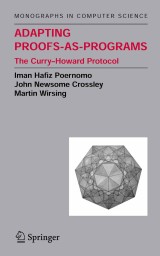Details

Adapting Proofs-as-Programs
The Curry--Howard ProtocolMonographs in Computer Science
|
CHF 177.00 |
|
| Verlag: | Springer |
| Format: | |
| Veröffentl.: | 27.04.2007 |
| ISBN/EAN: | 9780387281834 |
| Sprache: | englisch |
| Anzahl Seiten: | 420 |
Dieses eBook enthält ein Wasserzeichen.
Beschreibungen
This book ?nds new things to do with an old idea. The proofs-as-programs paradigm constitutes a set of approaches to developing programs from proofs in constructive logic. It has been over thirty years since the paradigm was ?rst conceived. At that time, there was a belief that proofs-as-programs had the - tential for practical application to semi-automated software development. I- tial applications were mostly concerned with ?ne-grain, mathematical program synthesis. For various reasons, research interest in the area eventually tended toward more theoretic issues of constructive logic and type theory. However, in recent years, the situation has become more balanced, and there is increasingly active research in applying constructive techniques to industrial-scale, complex software engineering problems. Thismonographdetailsseveralimportantadvancesinthisdirectionofpr- tical proofs-as-programs. One of the central themes of the book is a general, abstract framework for developing new systems of program synthesis by adapting proofs-as-programs to new contexts. Framework-oriented approaches that facilitate analogous - proaches to building systems for solving particular problems have been popular and successful. Thesemethodsarehelpful asthey providea formal toolbox that enablesa“roll-your-own”approachtodevelopingsolutions.Itishopedthatour framework will have a similar impact. The framework is demonstrated by example. We will give two novel - plications of proofs-as-programs to large-scale, coarse-grain software engine- ing problems: contractual imperative program synthesis and structured p- gram synthesis. These applications constitute an exemplary justi?cation of the framework. Also, in and of themselves, these approaches to synthesis should be interesting forresearchers working in the target problem domains.
Prologue.- Generalizing Proofs-as-Programs.- Functional Program Synthesis.- The Curry-Howard Protocol.- Imperative Proofs-as-Programs.- Intuitionistic Hoare Logic.- Properties of Intuitionistic Hoare Logic.- Proofs-as-Imperative-Programs.- Structured Proofs-as-Programs.- Reasoning about Structured Specifications.- Proof-theoretic Properties of SSL.- Structured Proofs-as-Programs.- Generic Specifications.- Structured Program Synthesis.- Epilogue.- Conclusions: Toward Constructive Logic as a Practical 4GL.
Details several important advances in the direction of practical proofs-as-programs paradigm, which has applications in industrial-scale, complex software engineering problems The authors develop two novel applications in large-scale, coarse-grain software engineering problems The applications given in the book should be interesting for researchers working proofs-as-programs, logical frameworks, and computational logic
<P>This monograph details several important advances in the direction of a practical proofs-as-programs paradigm, which constitutes a set of approaches to developing programs from proofs in constructive logic with applications to industrial-scale, complex software engineering problems. One of the book’s central themes is a general, abstract framework for developing new systems of program synthesis by adapting proofs-as-programs to new contexts. The authors call this framework the Curry--Howard Protocol and use it to show how proofs-as-programs can be adapted to two novel applications in large-scale, coarse-grain software engineering problems: contractual imperative program synthesis and structured program synthesis. These adaptions constitute an exemplary justification for the applicability of the protocol to different contexts. </P>
<P>This book is intended for graduate students in computer science or mathematics who wish to extend their background in logic and type theory as well as gain experience working with as gain experience working with logical frameworks and practical proof systems. In addition, the proofs-as-programs research community, and the wider computational logic, formal methods and software engineering communities will benefit. The applications given in the book should be of interest for researchers working in the target problem domains.</P>
<P>This book is intended for graduate students in computer science or mathematics who wish to extend their background in logic and type theory as well as gain experience working with as gain experience working with logical frameworks and practical proof systems. In addition, the proofs-as-programs research community, and the wider computational logic, formal methods and software engineering communities will benefit. The applications given in the book should be of interest for researchers working in the target problem domains.</P>


















